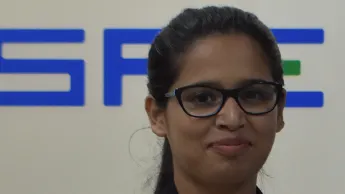Green Talent Parmita Ghosh: the hardships faced by farmers in India
- 2022-12-10
- Gunda Achterhold
- Comment

Unpredictable weather conditions threaten the harvests in large parts of India and cause concerns for farmers year after year. Parmita Ghosh comes from Teliamura, a town right in the east of the country, even further east than Bangladesh. Even though she was raised in a town, she learned very early on how hard life in the countryside can be. 'A school project involved us holding discussions with farmers from our region', says the now 25-year-old agricultural engineer. 'Weather forecasts didn’t reach these farmers and they didn’t have any access to advisory services.'
They wouldn’t have been able to prevent serious crop damage caused by bad weather, pests or diseases. 'This was a very upsetting discovery for me as a 14-year-old.' It was one reason why Parmita Ghosh later decided to earn a degree in agricultural engineering.
Helping to prevent crop damage
The young researcher is now committed to using her technical know-how and innovative methods to find sustainable solutions that will support farmers in their planning and help prevent crop damage. She was the first non-doctoral female researcher from India whose achievements have been recognised with the Green Talents Award 2020. This prize awarded by the Federal Ministry of Education and Research (BMBF) enables early career researchers to undertake research visits and make use of important networking opportunities (see information box). This is the first year in which researchers from India, Benin, Japan and Malawi have received the award.
'That’s simply fantastic', says as she smiles broadly. The former DAAD scholarship holder has joined the conversation via Skype. 'The coronavirus means I’m currently working from my home in Teliamura', she explains.
Master’s project in Darmstadt
In 2018, she was working on her master’s project as part of the Master Sandwich Programme run by DAAD and the Indian Institutes of Technology at the Technical University of Darmstadt. Parmita Ghosh developed a novel, machine-based learning model for predicting crop yields using the example of crop plants in Hesse. In this time she also established contact with the at the Hessian State Statistical Office and learned to speak a little German.
'I came to know Germany as a very open country', she recalls. She was particularly impressed by the freedom within research. The gave her the opportunity to share her experiences with young students and facilitate their start at a German higher education institution.
The application of learning logarithms
Her transition from education into employment was smooth: Parmita Ghosh joined Corteva Agriscience as a remote sensing data scientist directly after completing her master's degree in the summer of 2019. This globally active company develops solutions for increasing crop yields in the agricultural sector.
'My research area is still very rare globally', says Ghosh. She relies on the potential of remote sensing satellite data and uses machine learning applications to address agricultural issues; in other words she uses learning logarithms that classify large and heterogeneous volumes of data and detect patterns.
One of the plant monitoring systems she has developed is based on statistical evaluations and it forecasts trends. It uses satellite images to provide the applications with data for estimating crop yields, monitoring plant health and classifying and estimating the biomass of cultivated plants.
The battle against hunger as a driving force
'These forecasts even enable farmers to make important decisions in an early cultivation phase', says Ghosh, 'including the distribution of water resources, for example.' Her data also provides political decision-makers with a factual basis for their decisions, such as the early alignment of export and import strategies or the timely planning of subsidies for farmers. 'The greatest challenge lay in obtaining representative figures and high quality data', says Ghosh. Here she collaborated closely with lots of partners from different disciplines and countries.
The battle against hunger and the opportunity of using her research to provide concrete help to small farmers in particular is what drives Parmita Ghosh. 'My greatest success to date is an algorithm for detecting rice varieties', she tells us. 'I’m just finishing the model.' It should assist farmers in the introduction of new water-saving varieties and enable them to achieve two or perhaps even three harvests a year in the future. Saving water, reducing costs, optimising yields: 'If our application can contribute to that, it would be good for the environment and for the well-being of the farmers.'
Exchange of ideas at the virtual Science Forum
Receiving the means a lot to this early career researcher from India. Especially since she was appreciated as a female researcher involved in the industry. 'It is quite exceptional.' She is particularly looking forward to collaborating with top rate experts from all over the world. 'This is a major for me.'
She talks excitedly about the sessions and workshops organised as part of the first Science Forum to be held in a virtual format. 'I had never before heard so many different researchers from so many disciplines.' Parmita Ghosh remains loyal to her employer, who she feels gives her a lot of support and encouragement in her research. 'There is still so much to do', she exclaims. 'I’ll continue to commit myself to alleviating the farmers’ hardships – and above all to providing the technical resources they need.'
Further information
Striving for International Cooperation in Sustainability Research
Using modern technologies like machine learning, Parmita’s research provides statistics at field level and forecast trends for the agricultural sector.
FONA is the platform of the Federal Ministry of Education and Research (BMBF) for research into sustainability.
